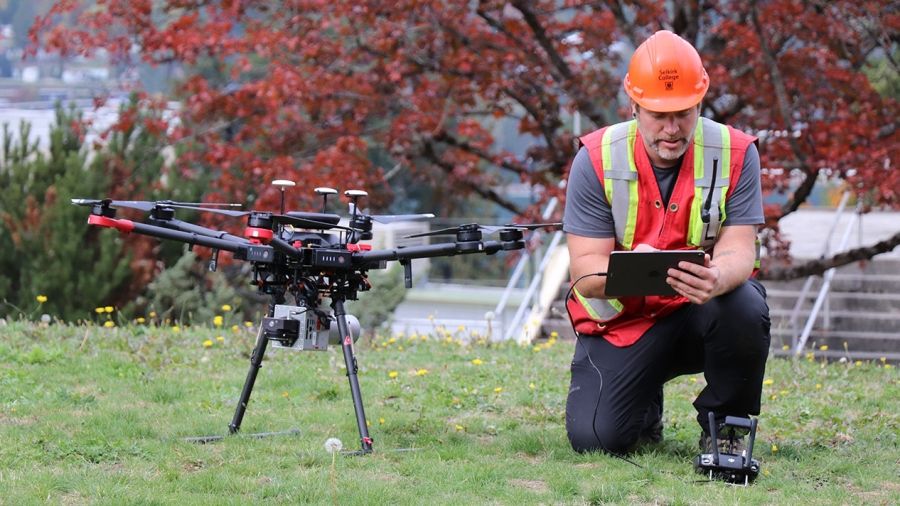
Designed to provide learners an opportunity to enhance skills with a vital technology now applied in a myriad of industries, Selkirk College is offering a comprehensive drone micro-credential program that dives deep into the application and operations of a tool that is transforming the way we work.
A five-month program delivered through a blend of online and in-person training, the Drone Technologies Program is a part-time study opportunity that begins March 21. Developed and delivered by the team at Selkirk Innovates, students will be guided by instructors who are leaders in the field and use the latest state-of-the-art equipment.
“The development and design of this micro-credential training is in direct response to continuous identification of real time training needs resulting from ongoing conversations with our industry partners which enables our team to develop, deliver and refine high impact offerings,” says David Greaves, one of the instructors who helped develop the unique program over the last year. “This is an ongoing training need for a variety of sectors. Workers with drone specific technology skills will continue to be required by companies in the years to come. The Selkirk College team has specialized training in this area and are uniquely positioned to lead related training in British Columbia.”
The micro-credential program is being offered for the first time to those looking to build skills and knowledge necessary to effectively use drones in a variety of business and public sector domains working as pilots, drone-based sensor data acquisition specialists, data technicians and remote sensing technicians. Examples of work associated with drone technology include weather forecasting, agricultural and livestock surveys, aerial pest and pathogen treatment, flood and landslide mapping, police and fire response, search and rescue, wildfire surveillance and surveys, and photography/cinematography for fields like real estate, construction, film and entertainment industry.
The program is open to both current Selkirk College students wanting to compliment their education and new learners seeking upskill opportunities from a variety of sectors that include forestry, mining, construction, real estate, policing and emergency management.
“The in-person element of the program will ensure we actively promote drone pilots who are champions for professionalism and safety,” says Greaves. “This hands-on approach will instill greater confidence and provide more opportunities for defining clear pathways to employment via our ever-growing research programs driven by industry specific needs. Partner feedback has shown employer interest in having this complementary training provided to other college program students as well as for re-training staff via our work integrated learning initiatives.”
An Unexpected Turn Towards Expert
Greaves graduated from Selkirk College’s Recreation, Fish & Wildlife Program in 2015 and then continued his education in the Bachelor of Geographic Information Systems (GIS) Program. While focusing on his GIS studies, he was a member of the Selkirk College Drone Club where he became captivated by the potential of the rapidly advancing technology.
“This planted the seed and I was hooked on the possibilities of what I might do with drones,” he says.
Greaves was hired as a summer co-op student at the Selkirk Geospatial Research Centre and then focused his bachelor’s thesis on using the technology on mapping habitat characteristics of the Slocan River. After graduation in 2017, he was hired as a research assistant at Selkirk Innovates and worked on a broad range of projects involving drones.
Now a faculty researcher at Selkirk Innovates, Greaves is an expert who has worked on numerous rewarding projects that include identifying locations used by wolverines for denning to conserve habitat, fish count surveys, forest management planning, wildfire hotspot detection using thermal imagery, wildland urban interface, hydrological recovery and dozens more.
With a growing need in the region for more formal drone education, Greaves joined colleagues and fellow experts Rob MacQuarrie, Ian Dennis and Justin Robinson in developing the Drone Technologies Program micro-credential. It’s a career focus and education Greaves is excited to share with students.
“I really enjoy the opportunity to balance my office work responsibilities with field data acquisition activities taking place in the beautiful landscapes our work seeks to manage and preserve,” says Greaves. “This field of work has provided me opportunities to guide aspiring students with their projects and academic pathways, enhance landscape management practices, enable decision makers with actionable data and ensure I am forever challenged to learn something new as the technology continues to evolve. It’s definitely an exciting time to take flight in the drone industry.”
Students will receive 135 hours of training over 19 weeks which includes 75 hours of instructor-led in person and online learning, and 60 hours of field work. Tuition and fees for the initial intake of this program have been waived with support from the Ministry of Advanced Education & Skills Training.
You can learn more about the Drone Technologies Program and how to register here.
Learn more about Selkirk Innovates and join us on Facebook.
A faculty researcher at Selkirk Innovates, David Greaves is preparing to take students through the fine-month Drone Technologies Program focused on providing the application and operations of a tool that is transforming the work that is being conducted in a wide variety of sectors.
David Greaves graduated from both the Recreation, Fish & Wildlife Program and Bachelor of Geographic Information Systems Program. He is now one of the regional experts in drone technology application and operation.
